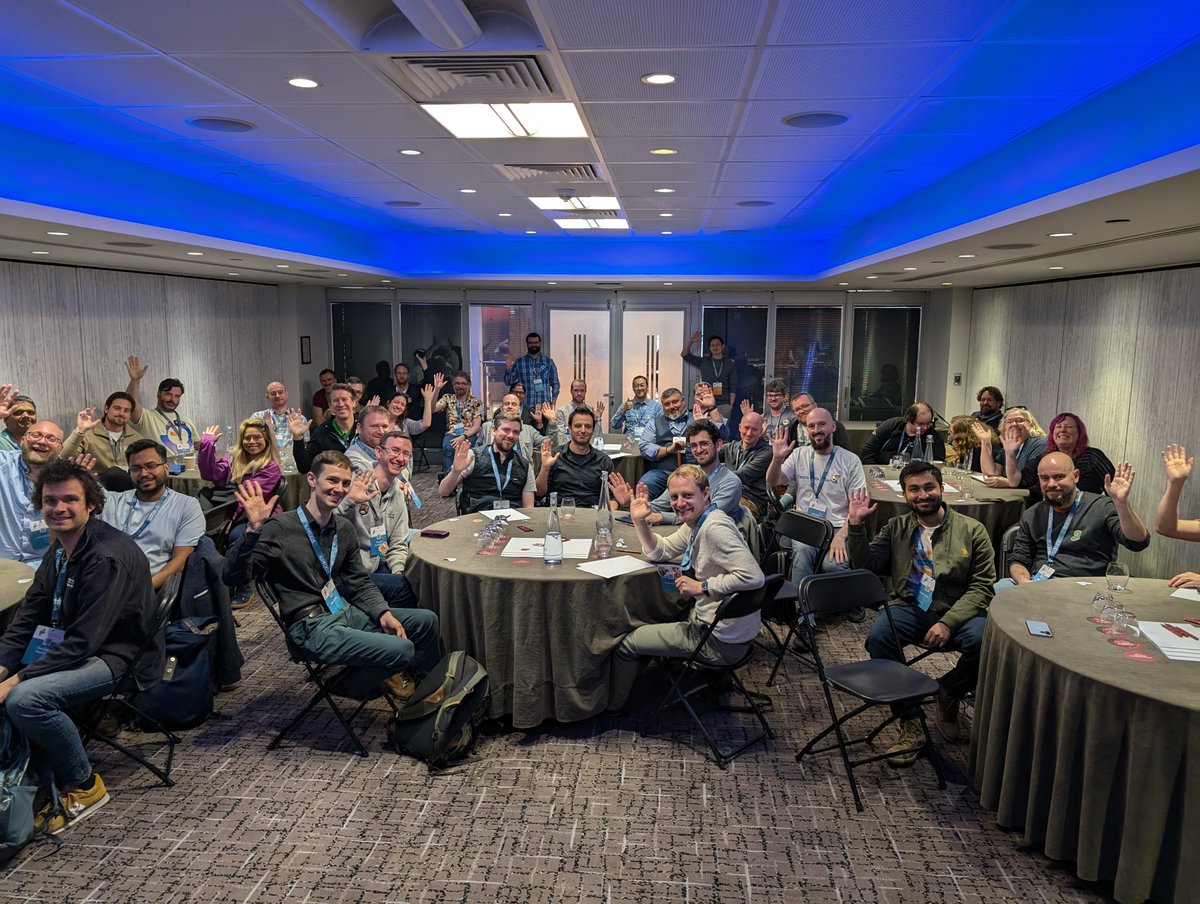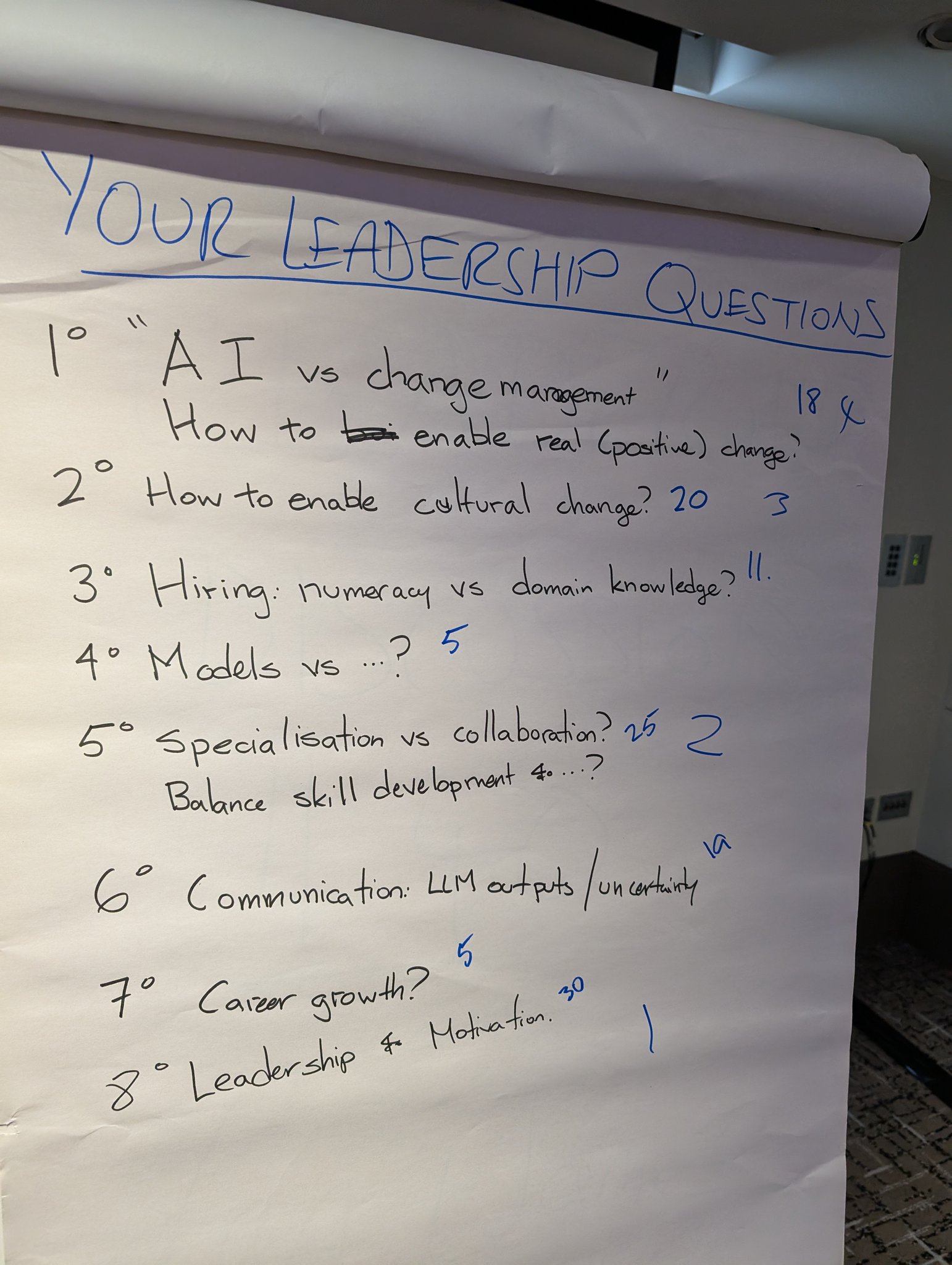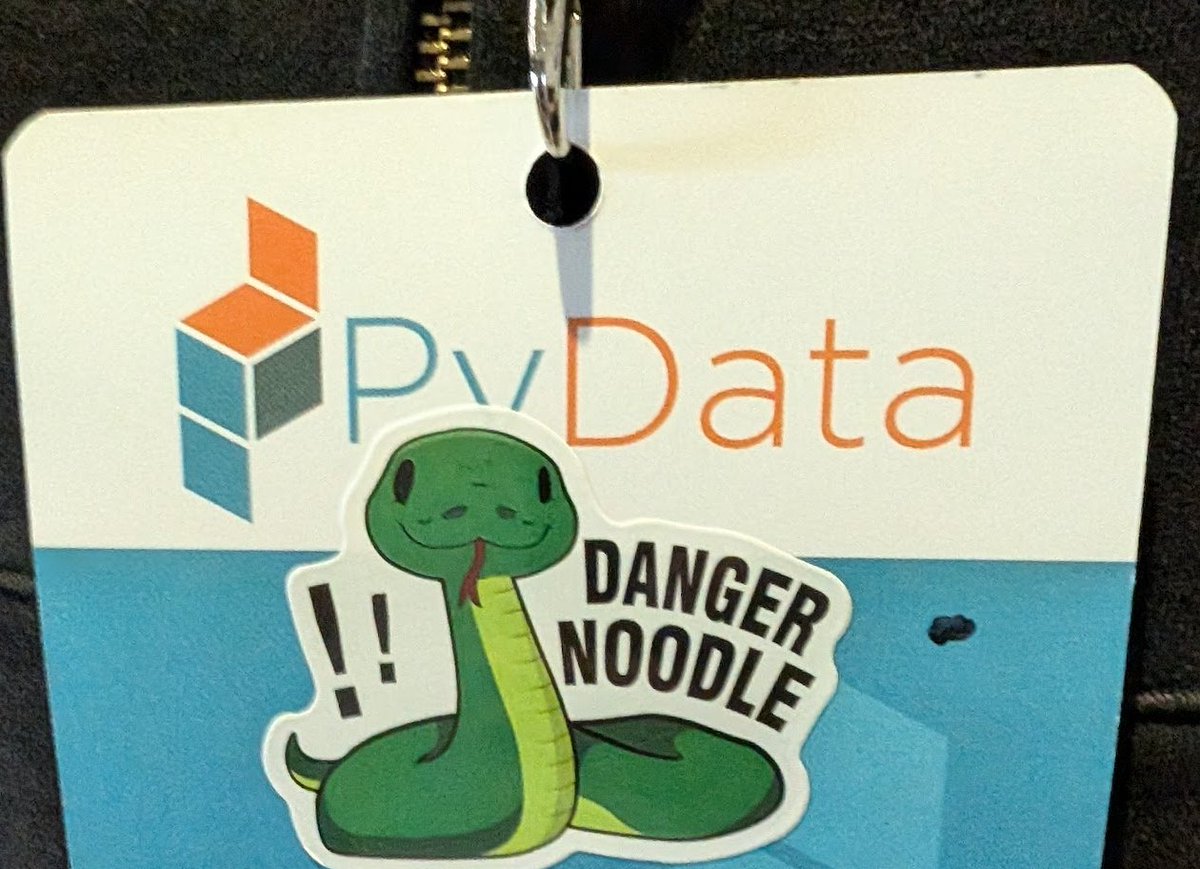At this year’s PyDataLondon 2024 conference I ran my regular Leadership discussion for team leaders & department heads. It is an open session for 40-60 senior people, under Chatham House rules, to discuss issues and seek feedback. We had a lot of happy people in the room for this session (photo below – taken with the understanding that this would be made public). This is the 8th and a deeper session I ran at PyDataGlobal 2022 was written up.
Ian Ozsvald always does a great job running the leader’s session (see his write-up in the comments). I came away with a bunch of new contacts and some useful highlights. Have you noticed how your own mood and stress can impact your team – maybe you need a holiday? Legacy code is “code that makes money”, and shouldn’t be thought of so negatively. And Laszlo Sragner on understanding motivation with self-determination theory “for an individual to be continuously motivated in their role, three factors need to be present: autonomy, mastery and relatedness.” (see his post in the comments) – via Ryan on LI
In this session we talked about demotivated team members, collaboration vs specialisation and enabling change in resistant organisations. I start the sessions by gathering feedback from attendees which is shown below. We got 8 and voted these to a top 3.
Leadership vs demotivation
What do you do if a team member is given a project and they accept it, but they don’t want it?
- Poor motivation might mean they’re on a “low energy, low skill” project given their interests – maybe that can be paired with a second more-fun project
- Ryan wrote this up and expanded it on LI (and you should go read it!)
- Working collaboratively could be more fun than solo projects
- Self determination theory talks on autonomy, mastery and purpose – perhaps they’ve hit a point of frustration that needs to be identified?
- Further detail from Laszlo on You Only Need These 3 Data Roles in a Data Driven Enterprise
- Ask them “how can we make this more interesting for you?”
- Alienation theory was briefly noted
- Some might think “legacy is boring” but “legacy is the stuff that makes money” – help the person see why their project is valuable in the org and how this could help them e.g. with visibility, winning points, promotion prospects etc
- Successful teams should never burn out, so what’s blocking success for this person?
- A lack of motivation might mean they don’t understand the value of the project?
- Founder grumpiness can infect the team – sometimes the wider team need to do an intervention to send you on holiday so after you can lead with confidence
Specialisation vs collaboration
Once you’ve built a team you win more by collaborating further afield, not just be specialising in the team – how to encourage this?
- Think on circles of impact – things you’re supposed to do around you, your team, the department and the company – how can you multiply your impact?
- A large org uses a structure that looks to career growth, business impact and skill-driven growth – sometimes people have to focus on business impact, other times they can focus on skill-driven (“CV driven”) development – this is acknowledged and balanced out
- Juniors need to focus on career development and maybe they are motivated personally to gain skills – you have to help them manage their expectations on business need vs personal need
- In another large org they’re experimenting with 3-person self-directed teams who self-organise (under a “better to ask forgiveness than permission” experiment), they figure out the best way to engage with the wider business
- The idea of moving to a Data Mesh Architecture encompassing principles around domain ownership, data as a product, self serve data infrastructure platform and federated governance to enable teams to engage without being silos in a growing organisation
During the session I also handed out snake-stickers so folk could self-identify in the following lunch and afternoon sessions, I’m told this worked well and helped folk find other leaders to continue the conversation:
Enabling change
How do you deal with managers and leaders who resist change with arguments like “I can do it with intuition well enough already” (when it is clear that valuable improvements can be made beyond this).
- Avoid any big-change projects that’ll surprise the end users at the “successful end” of the development phase – instead get several end users involved early so that confidence builds and positive change occurs from early on
- What numbers do they use already to drive decision? What causes them to get buy in? Could you couple your ideas with the results they’re seeking?
- With a “conservative” team you might take them slowly on a journey from simple automation and reporting to increasing complexity, reducing fear and increasing the size of outcomes
- Can you find ambassadors who help to bridge the gaps of fear and mis-understanding, then give them examples of what’s worked elsewhere in the organisation to build confidence?
- People can be afraid of new technology and process change so support anything that derisks the new approach and solves whatever causes the resistance
During the session I also talked about a practice I’ve developed called a “crit” (constructive critique) which I use in my private RebelAI leadership group. A member gets to present a problem and seek feedback from 12+ people on the call. They get 5 minutes to share some slides setting the scene (context, what they need, what worked and failed, what they’re after from the feedback) and then 40 minutes of feedback is given.
I suggested that this be taken back as a kind of Mastermind Group , you’d get 5+ people in your org, agree to meet monthly, then take turns sharing opportunities and gaining feedback in a trusted group. We go further inside RebelAI including an active Slack group, but to build a useful, trusted and supportive group the regular meeting and “crits” would be a great starting point.
If you are in a data science leadership role, you’ve got opportunity and challenge ahead and you’d like either some advice, or perhaps to be a part of my private data science leadership group (RebelAI), contact me through LinkedIn.
Ian is a Chief Interim Data Scientist via his Mor Consulting. Sign-up for Data Science tutorials in London and to hear about his data science thoughts and jobs. He lives in London, is walked by his high energy Springer Spaniel and is a consumer of fine coffees.


